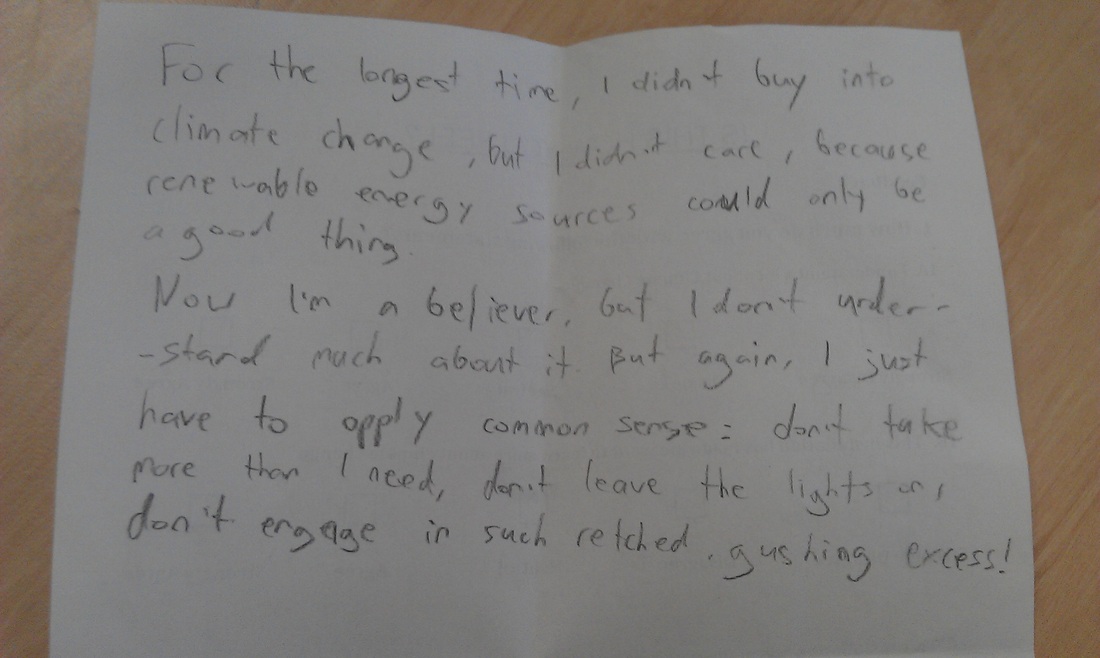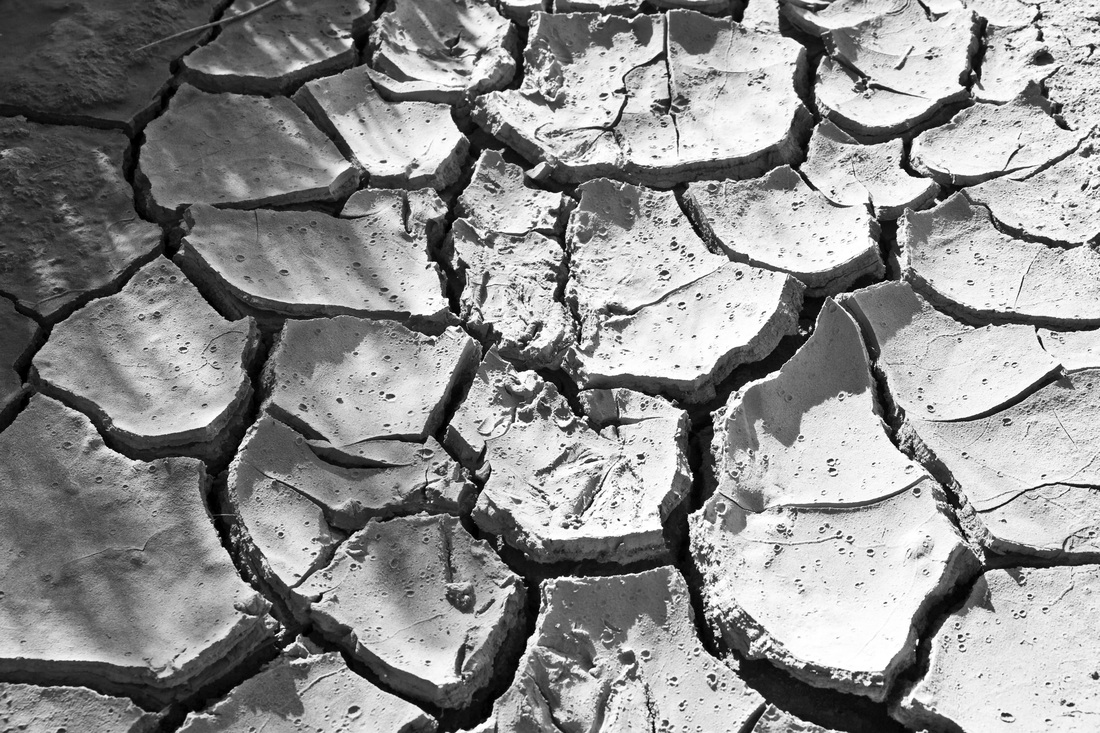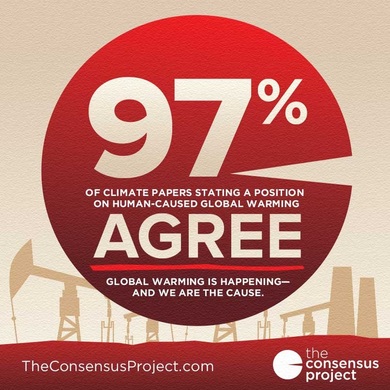
Guest Blogger: Dr Sarah Perkins
Dr Sarah Perkins is a researcher based at the University of New South Wales. Part of the ARC Centre of Excellence for Climate System Science, her work focusses on Australian climate extremes. Dr Perkins was one of the first researchers to contribute a letter to ITHYF.
Dr Sarah Perkins is a researcher based at the University of New South Wales. Part of the ARC Centre of Excellence for Climate System Science, her work focusses on Australian climate extremes. Dr Perkins was one of the first researchers to contribute a letter to ITHYF.
Liz West/Flickr CC BY 2.0
Science and emotion. Two words that I never thought would appear next to each other.
I must admit, I was a bit shocked when Joe asked me to write a letter on how climate change makes me feel. I’d never actually been asked that before. I’d never really considered it.
But the more I thought about it, the more I realized that our impacts on the climate, and our lag or lack of doing anything to change this, does indeed conjure up some feelings.
Angry. Concerned. Disappointed. Perplexed. Embarrassed. Helpless.
This is how I feel about our actions, as well as our inactions, towards our (one and only) climate.
While my letter is more abstract than the other scientist’s letters, these feelings are what I was trying to convey, as if I was writing to a close friend or relative. Someone that we are intricately connected to and dependent upon, just like we are intricately connected to and dependent upon our climate. To me, not doing anything to mitigate and reduce our climatic impacts is just as bad as ignoring a terminal illness of someone very close to us.
Now I must be very clear. First and foremost I am a scientist, and not a confused emotional freak like some cranks accused me to be after reading my letter. My job is to analyse the data and the evidence it provides. And do this again, and again, and again and again. And then consult with national and international colleagues. And apply any suggestions they may have. Then to check the results. Multiple times. All over again.
You see, scientists are trained to be exceedingly thorough, and climate scientists are no exception to this. Science-101 is to repeat your experiment and analysis multiple times so that you have robust results. I remember this lesson in high school. The scientific method is drummed into us in our very early years, we live and breathe it every day. We don’t just sit at our desk, faff about for a couple of hours, and then plot up what we like. We work on projects on timescales of months to years, and make sure we are applying the most appropriate analysis techniques as much as we possibly can.
And this is why it shocks me that the people who can influence great change don’t seem to be listening.
Emotions and feelings do not come into the scientific analysis. No way. Never, ever, have I looked at my results and felt emotion. When I look at my results what goes through my mind is: Have I used the right techniques? Are the results robust? What else should I try? Have I plotted it correctly? What do other data sources say? Are these results consistent with other studies? What do the results actually mean? What are the inferences and usefulness of this study? And only when I am satisfied with corresponding answers will I publish and disseminate the results.
And I guess this is where feelings start to creep in. Not from the results themselves, but from peoples' reactions to them.
I don’t get how people cannot care, or are not concerned. I also can’t understand how they think we’re making it up for personal gain. What do we climate scientists have to gain from presenting the facts? It’s certainly no comparison to what fossil fuel companies have to gain from squashing these facts. It makes me concerned, disappointed, and perplexed that some people think this way.
It makes me angry, embarrassed and helpless that despite being one of the biggest greenhouse gas emitters per capita, we are doing comparatively nothing on the global scale to reduce our emissions and mitigate the impacts.
The way I see it, it’s non-human not to have feelings about the rate of climate change we are inducing, and the impacts we are therefore causing. And while scientists do not consider emotions while working, I cannot comprehend how some people do not feel even the slightest bit worried about the sheer gravity of impacts we are facing.
Now I must be very clear. First and foremost I am a scientist, and not a confused emotional freak like some cranks accused me to be after reading my letter. My job is to analyse the data and the evidence it provides. And do this again, and again, and again and again. And then consult with national and international colleagues. And apply any suggestions they may have. Then to check the results. Multiple times. All over again.
You see, scientists are trained to be exceedingly thorough, and climate scientists are no exception to this. Science-101 is to repeat your experiment and analysis multiple times so that you have robust results. I remember this lesson in high school. The scientific method is drummed into us in our very early years, we live and breathe it every day. We don’t just sit at our desk, faff about for a couple of hours, and then plot up what we like. We work on projects on timescales of months to years, and make sure we are applying the most appropriate analysis techniques as much as we possibly can.
And this is why it shocks me that the people who can influence great change don’t seem to be listening.
Emotions and feelings do not come into the scientific analysis. No way. Never, ever, have I looked at my results and felt emotion. When I look at my results what goes through my mind is: Have I used the right techniques? Are the results robust? What else should I try? Have I plotted it correctly? What do other data sources say? Are these results consistent with other studies? What do the results actually mean? What are the inferences and usefulness of this study? And only when I am satisfied with corresponding answers will I publish and disseminate the results.
And I guess this is where feelings start to creep in. Not from the results themselves, but from peoples' reactions to them.
I don’t get how people cannot care, or are not concerned. I also can’t understand how they think we’re making it up for personal gain. What do we climate scientists have to gain from presenting the facts? It’s certainly no comparison to what fossil fuel companies have to gain from squashing these facts. It makes me concerned, disappointed, and perplexed that some people think this way.
It makes me angry, embarrassed and helpless that despite being one of the biggest greenhouse gas emitters per capita, we are doing comparatively nothing on the global scale to reduce our emissions and mitigate the impacts.
The way I see it, it’s non-human not to have feelings about the rate of climate change we are inducing, and the impacts we are therefore causing. And while scientists do not consider emotions while working, I cannot comprehend how some people do not feel even the slightest bit worried about the sheer gravity of impacts we are facing.
Sarah has her own blog over at sarahinscience and tweets using @sarahinscience. Follow her for relevant, up-to-date climate information.




 RSS Feed
RSS Feed
